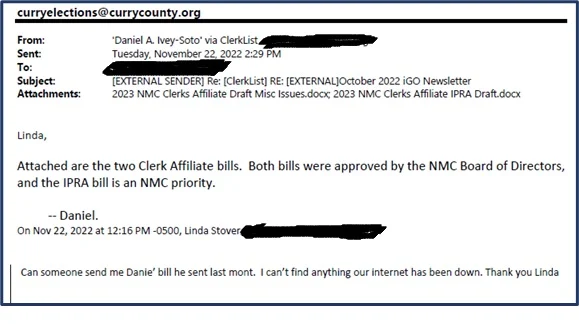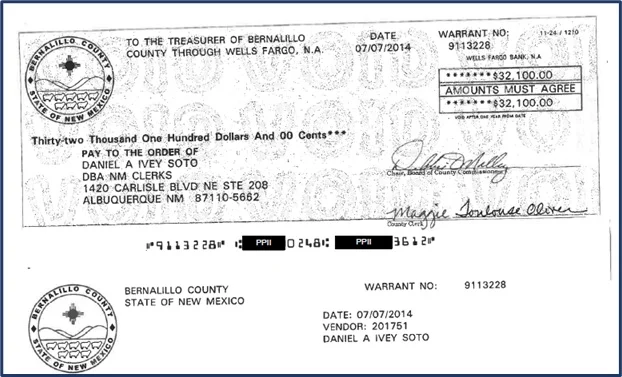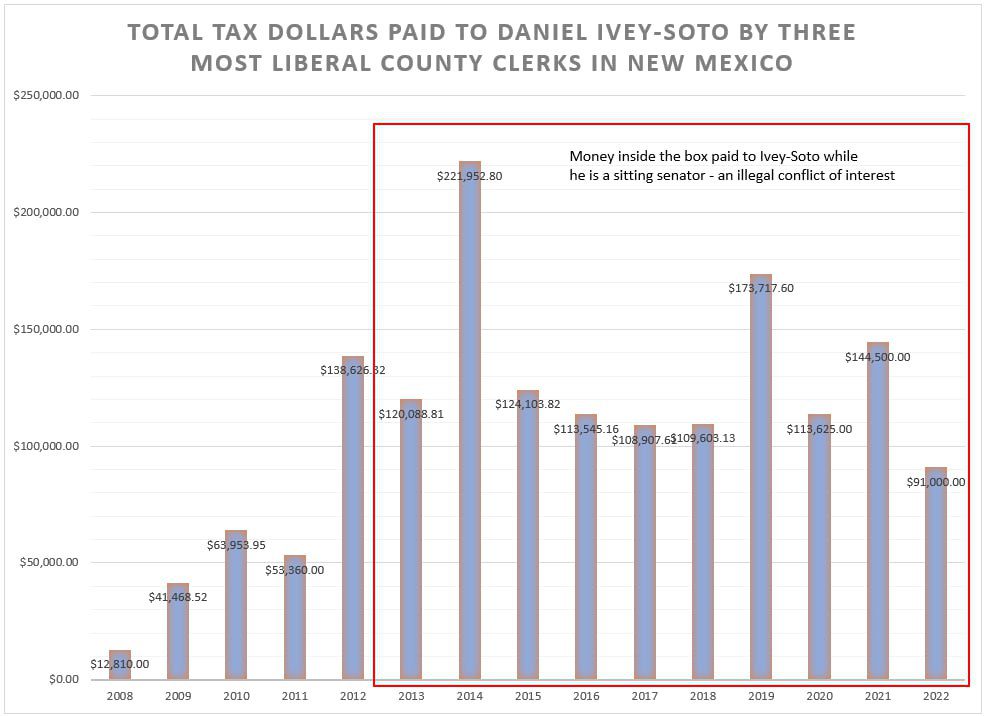(On February 17, 2023, this article was updated from its February 14, 2023 version, “Secretary of State Maggie Toulouse Oliver, and County Clerk Amanda Askin, together Paid NM Senator Daniel Ivey-Soto $1.75 Million in Taxpayer Money– Why?”)
The original article was originally published as Part 2 of a four part series on February 3, 2023 as a “guest post” in The Gateway Pundit, and the article was updated on February 14, 2023.
Since then it came to our attention that Santa Fe County paid Daniel Ivey-Soto $258,000 for his “services”. Dona Ana County paid Daniel Ivey-Soto $567,000 for services listed on his contract (below):

We are adding what Ivey-Soto received from Dona Ana County and Santa Fe counties to the nearly $925,000 we already reported to readers. This brings the sum total of funds Daniel Ivey-Soto has been given by taxpayers to about $1,750,000.

As revealed in Part 1 of this series, Daniel Ivey-Soto is a New Mexico Senator who also runs a non-profit called Vandelay Solutions which advises county clerks on technical matters related to elections and other duties.
This article will focus on partisan activities pursued by Ivey-Soto and the fact that he has received at least $1,750,000 in taxpayer dollars for consultation and assistance in drafting, promoting, and voting on legislation that directly benefits his clients and friends, but hurts the public.
Vandelay Solutions was previously known as “NM Clerks,” but that company was dissolved and rebranded as Vandelay Solutions in 2019 after some clerks complained that the original name could mislead people into thinking Ivey-Soto’s company was a government agency. Ivey-Soto admitted as much in a recorded conversation that election workers were concerned that he was “running the clerks.” Instead of clearly communicating his company is not a government agency, Ivey-Soto still uses the “NM Clerks” brand for the email list serve he runs with all 33 county clerks, according to public documents we obtained.
While not all of the 33 clerks are paying clients, it is unclear whether the clerks understand that Ivey-Soto has no authority over them and is not acting in an official governmental capacity, given Ivey-Soto’s regular directives and backroom meetings. For example, in June, Ivey-Soto met in a closed-door session with the Torrance County Commission directing them to certify the 2022 primary post-election results despite evidence that Dominion machines were not legally certified for use.
We obtained more than a thousand pages of emails to and from Ivey-Soto as part of this county clerk list-serve. Although Ivey-Soto represents that his company’s efforts are restricted to technical assistance, it was found not to be the case. As noted in Part 1, Ivey-Soto encouraged all of New Mexico’s clerks to ignore the effort of many citizens to obtain answers to questions of anomalies and vulnerabilities in their voter rolls and election system following the controversial 2020 election.
Due to the controversial nature of the 2020 General Election, rule changes, and anomalies discovered in the data, citizens filed multiple requests for public records in the summer of 2021 before the records were scheduled to be destroyed. Emails discussing and even complaining about the requests for public documents were circulated on Ivey-Soto’s “NM Clerks” list-serve. The SOS, Maggie Toulouse Oliver, even complained about it publicly – accusing the people of malicious intent in their quest for transparency.
In October 2022, Ivey-Soto circulated an email with an attached draft piece of legislation that later appeared on the Senate floor as SB 180. The draft legislation would remove all election records from being discoverable under the Inspection of Public Records Act (IPRA), thus “solving” the problem of the clerks who were complaining about having to respond to IPRA requests, while at the same time, further shrouding the election system in secrecy.
Ivey-Soto does not disclose anywhere on his website or in the contract that we were able to review, that he advises or assists his paying clients in drafting legislation, but a review of his correspondence affirms this to be the case.

Ivey-Soto’s conflicts of interest are self-evident. He has secured at least $1.75 million in taxpayer money from county clerks, concealed his donors over the past two years – which just happens to coincide with the greatest public confidence crisis in the history of U.S. elections.
Ivey-Soto drafts legislation that causes voters to complain to clerks because of a lack of transparency. The clerks tire of hearing the complaints, and pivot back to Ivey-Soto, who is then all too receptive in crafting new legislation to make once public records illegal to secure. It is unclear whether Ivey-Soto plans on disclosing his relationship to SB 180 or recusing himself when it comes before him for a vote. The bill was sponsored by Senators Katy Duhigg and Leo Jaramillo. We obtained copies of the campaign finance reports for both senators and found that Ivey-Soto gave each a maximum donation to their respective campaigns.


Ivey-Soto did not respond to a request for the names of the New Mexico counties where he has contracts, but we were able to obtain invoices from Ivey-Soto going back to 2008 from Bernalillo County, payments made by Dona Ana County to Ivey-Soto going back to 2009, and a copy of a contract with Curry County. Just from the documents that we were able to obtain, Ivey-Soto has been paid $1,750,000 in taxpayer money for his consulting services. The total sum is likely much larger than that. Ivey-Soto declined to answer how much he has been paid altogether for his services to clerks.
Most of the $925,000 previously reported was paid to Ivey-Soto by the Bernalillo County Clerk’s office. It is interesting to note that the checks to Daniel Ivey-Soto written between 2007 and 2016 were signed by Maggie Toulouse-Oliver, the current Secretary of State, indicating that the two had an established relationship going back 15-years.
Strong inferences exist that Ivey-Soto owes his career in consulting to Maggie Toulouse-Oliver and Maggie Toulouse-Oliver may have significant influence over the kinds of legislation that Ivey-Soto helps to write.
Maggie Toulouse-Oliver has a long-standing relationship with Mark Zuckerburg’s radical Center for Tech and Civic Life (CTCL) going back to when she was a county clerk. CTCL became famous during the 2020 election when they poured $419 million to fundamentally change the way Americans vote. Maggie Toulouse-Oliver has also engaged in smear campaigns against citizens and elected officials demanding transparency and more secure elections since 2020 – especially regarding the Otero County Audit of the 2020 election that was completed in 2022 by a team of national experts.

The amounts paid by Bernalillo County each year are shown in the graph below. The amounts vary, but average to $54,000 per year. The current annual salary for the Bernalillo County Clerk is less than $87,000 per year, meaning Ivey-Soto was getting paid two-thirds of the clerk’s salary to give technical assistance – on exactly what, we don’t know. We question this expenditure since Bernalillo County also pays a county attorney for advice interpreting statutes, and multiple vendors for technical assistance with their election equipment. The Secretary of State and Attorney General’s offices also support the county clerks. What services was Ivey-Soto providing Maggie Toulouse Oliver that were worth an average of $54,000 per year?
From the graph below, 2014 was a windfall year for Ivey-Soto when he received $140,000 in taxpayer dollars from Bernalillo County. There was no obvious reason from the invoices why Ivey-Soto’s take almost tripled that year. It should be noted, however, that 2014 was the year Dominion Voting Systems were implemented in New Mexico.

Regarding Ivey-Soto’s many self-evident conflicts of interest, his behavior is supposed to be governed by the Legislative Rules of Ethics. Rule 26-1(A) states, “Members…shall conduct themselves in a manner that justifies the confidence placed in them by the people. The members shall not use their offices for private gain and shall at all times maintain the integrity and discharge the high responsibilities of their legislative positions.”
Undermining election transparency not only hurts Ivey-Soto’s constituents and voters across the state, being paid large sums of money to do so violates the “confidence placed in [him] by the people.”
The legislative rules also acknowledge that since the New Mexico legislature is a volunteer legislature, the members are likely to have other jobs or businesses and conflicts of interest will necessarily arise. The Advisory Opinion 19-02 written by the Interim Legislative Ethics Committee weighs in on this issue. The opinion states, “The polestar for managing potential conflicts of interest is disclosure.” Meaning, wherever there may be the appearance of a conflict of interest, that conflict must be disclosed.
We currently have a copy of only one contract written between Vandelay Solutions and a New Mexico county, but it contains no disclosure statements that Ivey-Soto is also a sitting state senator who has material obligations to his constituency. In fact, Ivey-Soto’s name does not appear on the contract.
Conflicts of interest abound, but what about participation in a bribery scheme?
The New Mexico State Constitution gives three distinct definitions of bribery in Article 4, Section 39:
The first definition of bribery: “Any member of the legislature who shall vote or use his influence for or against any matter pending in either house in consideration of any money, thing of value or promise thereof, shall be deemed guilty of bribery.”
County clerks would do well to consider whether their payments to Ivey-Soto as a legislator to get the public out of their hair is tantamount to a bribe.
The second definition of bribery: “Any member of the legislature or other person who shall directly or indirectly offer, give or promise any money, thing of value, privilege or personal advantage, to any member of the legislature to influence him to vote or work for or against any matter pending in either house.”
The public would do well to consider whether Ivey-Soto’s maximum donation to his Democrat colleagues, Katy Duhigg and Leo Jaramillo, who sponsor and fast-track his bills is tantamount to a bribe.
The third definition of bribery: “Any member of the legislature who shall solicit from any person or corporation any money, thing of value or personal advantage for his vote or influence as such member shall be deemed guilty of solicitation of bribery.”
Has Ivey-Soto accepted donations from any person or corporation that has influenced how he either advises his clients or votes on legislation? We don’t know, because Ivey-Soto is two years behind in filing his 990 forms with the Attorney General.
According to the Legislative Rules, the proper way to deal with conflicts of interest is disclosure. When the conflict is aired, a discussion is possible among the legislators and the public, and an acceptable path can likely be found where the interests of the citizens of New Mexico will be protected. We have provided disclosure. It is up to the counties paying Ivey-Soto, the individual county clerks taking his advice, his colleagues who accepted his campaign donations, and his constituents who voted for him to find an appropriate path forward to protect the interests of the people of New Mexico.
This is the second article in a series on Daniel Ivey-Soto. Check out the other parts to this series:
- “Daniel Ivey-Soto, New Mexico’s Most Corrupt Senator.” Part 1: The election thief’s favorite NM senator is hiding his backers and clients.
- “New Mexico Senators with Blessing of Corrupt SoS Maggie Toulouse Oliver Push Legislation that Fully Corrupts NM Elections and Criminalizes Those Who Investigate.” Part 3: The destruction of the election franchise.
- “New Mexico’s Corrupt SOS, Maggie Toulouse Oliver, Tied to Twitter’s Illegal Speech Suppression Scheme after Violating First Amendment Rights of New Mexicans.” Part 4: Joint State Actors.
The public can provide tips to the Estancia News concerning this or other stories by sending an email to: [email protected].
- Breaking: Dominion/Liberty Vote Tabulator flips a vote in Chaves County – Changing the Outcome of a School Board Election - December 12, 2025
- Liberation for New Mexico is Coming - August 18, 2025
- ATTENTION DOGE: Department of Energy’s Land Grab in New Mexico and Colorado for “Green Energy” Must be Stopped - February 17, 2025


